Location
About Us
We envision a world in which land governance systems, both formal and informal, are effective, accessible, and responsive for all. This is possible when land tenure and property rights are recognized as critical development issues and when the United States Government and its development partners demonstrate consistent attention and a firm commitment to supporting coordinated policies and programs that clarify and strengthen the land tenure and property rights of all members of society, enabling broad-based economic growth, gender equality, reduced incidence of conflicts, enhanced food security, improved resilience to climate change, and effective natural resource management.
Mission Statement
The USAID Land Tenure and Resource Management (LTRM) Office will lead the United States Government to realize international efforts—in accordance with the U.S. Government’s Land Governance Policy—to clarify and strengthen the land tenure and property rights of all members of society—individuals, groups and legal entities, including those individuals and groups that are often marginalized, and the LTRM Office will help ensure that land governance systems are effective, accessible, and responsive. We will achieve this by testing innovative models for securing land tenure and property rights and disseminating best practice as it relates to securing land rights and improving resource governance within the USG and our development partners.
Members:
Resources
Displaying 191 - 195 of 440Video Highlights Land Project in Mozambique
This video from the Food and Agriculture Organization of the UN (FAO) profiles a project relating to secure access to land and resource rights in Mozambique. The 19 minute film is narrated mostly in Portuguese with English subtitles.
How to Respond to the Fundamental Changes in Mozambican Society as a Result of the Extractive Industries
The mainstay of this report, however, is not so much an examination of the extractive industries themselves as an examination of the Mozambican government’s and society’s ability to handle the impacts of these industries and where capacity growth is most urgently needed. In this regard, this investigation looks at three principal areas. The first area is about maximizing the receipts that reach legitimate government coffers. This includes the Extractive Industries Transparency Initiative, which ensures that company and governmentpayments match.
Land Reform Efforts in the DRC Should Look to the Voluntary Guidelines
A recent article from IRIN news discusses land and conflict, as well as some potential opportunities for land reform, in eastern Democratic Republic of Congo (DRC). According to the article, “land disputes are key drivers of conflict in eastern DRC, and they hinder development across the region.
Research on Vulnerable Populations and Land Rights
This research paper from USAID calls attention to the challenges faced by vulnerable populations with respect to land. The paper identifies five vulnerable groups who have weak claims on land rights and are particularly vulnerable to changes in land tenure systems and property rights reform:
Women
Households that have been directly affected by HIV/AIDS
Pastoralist communities
Indigenous populations
Council of Ministers Passes South Sudan Land Policy
On February 22, the South Sudan Council of Ministers passed the USAID-assisted draft Land Policy with minimal amendments. The Land Policy will now head to the National Legislative Assembly for review. While much work remains to be done, this event marks a notable step on South Sudan’s path toward developing institutions and policies for effective land governance.



